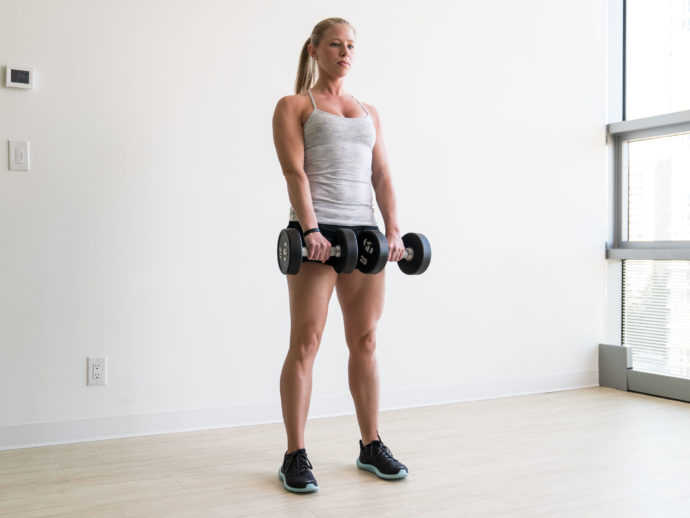A training program for women
The not-so-good news: bone density naturally decreases as we age. Since women generally have smaller bones than men, those who have especially low bone density are at risk of developing osteoporosis, which results in brittle, fragile bones that can more easily fracture. Estrogen, which protects bones, decreases as women reach menopause, also increasing our risk of osteoporosis.
The good news: women at any age can prevent bone loss—and even build new bone—by engaging in regular strength training. Engage in at least two strength workouts each week, training all major muscle groups each time.
Your strong bone workout
Aim for three rounds of 10 to 12 reps of these exercises, using weights that feel very challenging by rep number seven.

Deadlifts
Target: Hamstrings, glutes, low and upper back
Deadlifts work almost every muscle on the back of your body.
- Stand with feet shoulder-width apart, arms straight, holding dumbbells against the front of your thighs.
- Hinge your hips behind you and bend your knees, keeping your back flat and your head in line with your spine. The dumbbells will travel along your body; keep them almost touching your legs as they travel downward.
- Once the dumbbells reach halfway down your shins, press through your heels, focusing on using your hamstrings and glutes to pull yourself back up to the start position.

Incline Bench Press
Target: Chest, shoulders
A fundamental strength training exercise that improves muscle and bone density in your upper body.
- Set a weightlifting bench to a 30-degree incline. Sit with dumbbells resting on your thighs.
- As you lean back onto the bench, bring the weights to each side of your chest, with your upper arms under each dumbbell.
- Press the dumbbells up until your arms are extended. The weights should follow a slight arc, moving inward once you reach the top of the movement. Lower the weights to the sides of your upper chest and repeat.

Dumbbell Row
Target: Back, core
Rows strengthen the major muscles in your back, which can help improve your posture. As long as you maintain good form, don’t be afraid to go heavy on this one.
- Kneel on the side of a bench, with your left knee and hand on the bench, spine neutral. Position your right foot on the floor, slightly behind you. Grab your dumbbell from the floor.
- Keeping your back flat and abs braced, and without rotating your torso, pull the dumbbell up your side until your upper arm is just beyond horizontal. You should feel your right shoulder blade moving toward your spine.
- Lower the weight with control, and repeat for reps.

